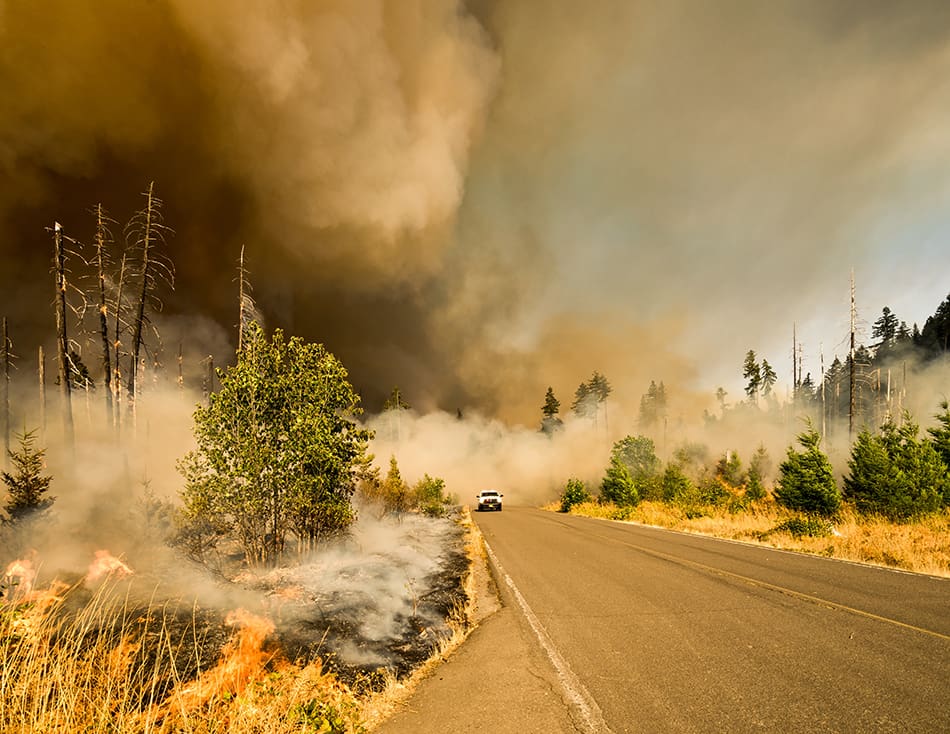Climate change refers to the long-term changes in the Earth’s climate that are warming the atmosphere, ocean and land. Climate change is affecting the balance of ecosystems that support life and biodiversity and impacting health. It also causes more extreme weather events, such as more intense and/or frequent hurricanes, floods, heat waves, wild fires, droughts, and leads to sea level rise and coastal erosion as a result of ocean warming, melting of glaciers, and loss of ice sheets.

Climate change is primarily caused by the increase in greenhouse gas concentrations in the atmosphere due to human activities. The most significant greenhouse gas is carbon dioxide (CO2), followed by methane (CH4), nitrous oxide (N2O), and others. These gases trap heat from the sun, preventing it from escaping back into space and leading to a warming effect known as the greenhouse effect.
Human activities such as the burning of fossil fuels (coal, oil, and natural gas), deforestation, industrial processes, and agricultural practices have substantially increased the concentrations of greenhouse gases in the atmosphere. This enhanced greenhouse effect is causing the Earth’s average temperature to rise, leading to various adverse impacts on ecosystems, weather patterns, and human societies.

Addressing climate change requires global efforts to reduce greenhouse gas emissions, transition to renewable energy sources, improve energy efficiency, promote sustainable land use practices, and enhance resilience to climate impacts. The United Nations Framework Convention on Climate Change (UNFCCC) and the Paris Agreement are international efforts aimed at mitigating climate change and adapting to its impacts. The Intergovernmental Panel on Climate Change (IPCC) has recommended to reduce emissions globally by 45% before 2030 and reach net zero by 2050.
Can individuals reduce their emissions and help reverse climate change?
No one country, leader, company, or individual can solve climate change alone –however we can all start to make a positive impact by taking individual actions and supporting broader efforts. While the challenge of climate change requires collective action at a global scale, every individual’s contribution matters. Here are some ways you can help:
- Reduce your carbon footprint: Minimize your greenhouse gas emissions by conserving energy at home, using energy-efficient appliances, insulating your home, and rethinking your travel habits, like using public transportation or carpooling more often. If you need to fly then only use high quality carbon offset solutions to compensate your travels.
- Conserve water: Be mindful of your water usage by fixing leaks, taking shorter showers, and watering plants efficiently. Water treatment and distribution require energy, so conserving water indirectly reduces carbon emissions.
- Adopt sustainable practices: Change your purchasing habits by buying less stuff, recycle and compost to reduce waste, choose reusable products over disposable ones, and opt for environmentally friendly alternatives such as cloth bags instead of plastic bags.
- Support renewable energy: Transition to renewable energy sources like solar or wind power for your home. If feasible, invest in solar panels or consider supporting renewable energy initiatives in your area.
- Eat a sustainable diet: Reduce your meat consumption, particularly beef and lamb, as livestock agriculture contributes significantly to greenhouse gas emissions. Incorporate more plant-based meals into your diet and support local, organic, and sustainably sourced food options. Don’t buy bottled water, if tap water is safe to drink in your area.
- Plant trees and support reforestation efforts: Trees absorb carbon dioxide and help mitigate climate change. Participate in tree-planting initiatives or support organizations working on reforestation projects.
- Stay informed and spread awareness: Educate yourself about climate change and its impacts. Share your knowledge with others, engage in discussions, and encourage sustainable practices in your community.
- Advocate for policy changes: Support political leaders and organizations that prioritize climate action. Contact your elected representatives to express your concerns and support policies aimed at reducing greenhouse gas emissions and promoting sustainable practices.
Remember, individual actions, when combined with collective efforts, can lead to meaningful change. By taking steps to reduce your own impact and inspiring others to do the same, you contribute to the broader movement toward reversing climate change.
Photo in News
Recent Posts
- Sri Lanka offers a world of adventures in one small islandFebruary 12, 2026
- 'Ice-breaking' visa waiver could dramatically boost Canada-China travelFebruary 12, 2026
- The latest resort openings and updates to inspire winter getawaysFebruary 12, 2026

















